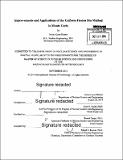| dc.contributor.advisor | Kord S. Smith. | en_US |
| dc.contributor.author | Hunter, Jessica Lynn | en_US |
| dc.contributor.other | Massachusetts Institute of Technology. Department of Nuclear Science and Engineering. | en_US |
| dc.date.accessioned | 2015-02-25T17:12:55Z | |
| dc.date.available | 2015-02-25T17:12:55Z | |
| dc.date.copyright | 2014 | en_US |
| dc.date.issued | 2014 | en_US |
| dc.identifier.uri | http://hdl.handle.net/1721.1/95598 | |
| dc.description | Thesis: S.M., Massachusetts Institute of Technology, Department of Nuclear Science and Engineering, 2014. | en_US |
| dc.description | Cataloged from PDF version of thesis. | en_US |
| dc.description | Includes bibliographical references (pages 61-63). | en_US |
| dc.description.abstract | Monte Carlo methods for reactor analysis have been in development with the eventual goal of full-core analysis. To attain results with reasonable uncertainties, large computational resources are needed. Variance reduction methods have been developed in order to reduce the computational resources required to obtain results in a practical amount of time. This work seeks to expand research in the Uniform Fission Site (UFS) method, a variance reduction technique recently developed that causes uniformity in uncertainty distributions by forcing uniformity in source distributions. This work aims to both improve the method as well as investigate its use with a source acceleration method, Coarse Mesh Finite Difference (CMFD) acceleration. Both techniques have been implemented into OpenMC, a continuous energy Monte Carlo code. The UFS method uses weights to alter the number of neutrons born at a fission site. It operates on a superimposed mesh, in which each mesh cell contains a different weight. These weights use an estimate of the source fraction and fuel volume fraction within the cell to produce uniformity. In current implementations, the fuel volumes are assumed to be dispersed equally over all mesh cells. This work aims to provide an estimate of the fuel volume fraction in each cell in order to improve the accuracy of the method for irregular geometries. The new fuel volume approximation method is tested on a toy problem and on a model of the Advanced Test Reactor, a core with highly irregular geometry. Figures of merit were calculated for a basic Monte Carlo simulation, a simulation with the standard UFS implementation, and the new UFS method with estimated volume fractions. With the toy problem, the new method showed significant improvement and had the highest figure of merit. In the case of the ATR, the long run time for the approximation lowered the figure of merit. Both problems demonstrated that the use of the standard UFS implementation on an irregular geometry produced higher uncertainties than not using the method at all. The UFS method, when used with the estimated volume fractions, behaved as expected and produced uniform uncertainty distributions. The investigation of the use of the UFS method with CMFD acceleration was conducted using the 3-D BEAVRS benchmark. Results showed that keeping CMFD acceleration on during active batches maintained a stationary source and reduced the variance for assembly results. The UFS method stacked on this, reducing the maximum relative uncertainties. The UFS method had variable results with different tallies, but no interference between the two methods was observed. | en_US |
| dc.description.statementofresponsibility | by Jessica Lynn Hunter. | en_US |
| dc.format.extent | 63 pages | en_US |
| dc.language.iso | eng | en_US |
| dc.publisher | Massachusetts Institute of Technology | en_US |
| dc.rights | M.I.T. theses are protected by copyright. They may be viewed from this source for any purpose, but reproduction or distribution in any format is prohibited without written permission. See provided URL for inquiries about permission. | en_US |
| dc.rights.uri | http://dspace.mit.edu/handle/1721.1/7582 | en_US |
| dc.subject | Nuclear Science and Engineering. | en_US |
| dc.title | Improvements and applications of the Uniform Fission Site method in Monte Carlo | en_US |
| dc.type | Thesis | en_US |
| dc.description.degree | S.M. | en_US |
| dc.contributor.department | Massachusetts Institute of Technology. Department of Nuclear Science and Engineering | |
| dc.identifier.oclc | 903703816 | en_US |
